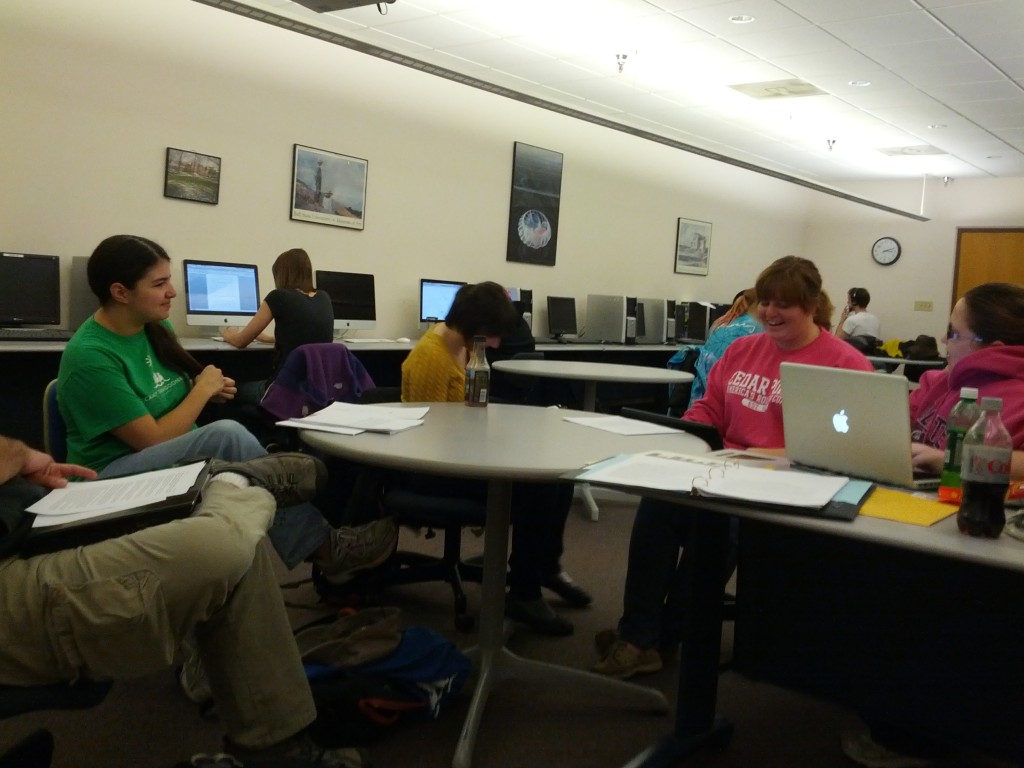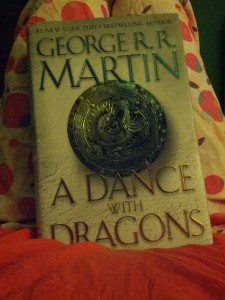This is the 7th Time I Taught Novel Writing

End-of-Term Observations
As you probably noticed, I didn’t blog much about teaching this course this semester.
I think that’s because I’ve almost got it “down” now, which is a relief after three years of tweaking!
What They Wrote
This is the seventh straight semester I’ve taught this course, and it always works out that: of 15 students
- about a third write realism
- about two thirds write something else
This semester, the groups were:
- Fantasy (entirely made up worlds)
- Realism (coming-of-age, historical fiction, thriller, satire, a memoir)
- Supernatural (part our world, part not our world)
I don’t know why it always works out that way, but it does. Seven semesters.

If you follow me on Goodreads, you’ll see that over the last few years I’ve been reading a lot more YA and fantasy. I feel like reading the George R. R. Martin books this summer and fall, for example, helped me be a better reader of the fantasy novels in my class. I know squat about fantasy–and I always tell them that.
But let me say this: you don’t need to have read ANY fantasy in order to read someone’s fantasy novel and offer an opinion. The only trick is whether the student is smart enough to still listen to you even after you admit that you’re unfamiliar with the genre.
What I Wrote
I wrote 2000 words a week along with my students. See, it’s all here. I ended up writing about 20,000 words this term, including a few new chapters for my novel, so that makes me happy.
I learned that I must stop waiting until the weekend to write. I have to open up the document at least a few times a week, even if it’s only to play with a few paragraphs.
Practice what you preach and all that.
Inside and Outside
The students in the class (inside the fishbowl) blogged each week about what we did for the benefit of the hundred or so people who subscribed to the blog and followed along (outside the fishbowl). You can sort of take the class–emphasis on sort of. Start here at Week 1 and follow along.
Note: I will not be offer a class transparently like this again.
- I’m glad that a few very dedicated people followed along and got well into their novels.
- I’m glad that my students learned a little about blogging.
- I’m glad that the class is archived for anyone else who cares to “take” it.
But no, I will not ever try that again. My energies were spread so thin I don’t know if they really benefitted anyone.
Lower Word-Count Quotas
A big change this term was that I required only 2000 words a week from students.
- My first year, students wrote about 3500 a week.
- The second year, students wrote 3000 a week.
- My third year, students wrote 2250 a week.
Ultimately, I decided that it’s important not to assign students more than the AAUP-recommended 6 hours of work outside class each week. I’ve been thinking a lot about time this term, as you know. I decided that 2000 a week was more realistic given the other demands of the class (reading novels, writing papers, etc.).
Despite the lowered quota, many students in this course struggled to get the writing done–more so even than when the word-count quotas were higher. I’m not sure how to explain this. If you have any ideas, I’m all ears.
Changes that are working well
I include myself in the Beta Group meetings and read 5 partials a week for three weeks rather than trying to read all 15 at once.
Ending the semester with a simulated submission process (using the students in another class as faux agents) has been very popular with all students involved and has provided a great occasion to talk about how vetting in publishing works.
Changes I’ll try next time
—Beta Group Bonding: putting students in their Beta Groups by genre interest right away AND making them sit together AND creating occasions for them to share their work with each other (either by trading pages or by getting them talking).
—Fewer novels. We did four. It was too much.
—The Reverse Storyboard Project remains one of the most significant challenges of the semester. They do the activity well, but they struggle to write the paper that articulates what they learned and how they learned it. Probably because they aren’t giving themselves enough time to write the paper after completing the activity. Next time, I’m going to create two deadlines: one for the activity (the cards) and one for the paper.
Looking forward
I can’t believe I’ve taught this class seven times.
Honestly, I think I need to take a break. The course is “Advanced Fiction,” and I teach it as novel-writing, although I could just as easily teach it any number of ways, or simply as an advanced-level workshop, just like I did for a long, long time.
Hmmm.
This is what I do, you see. Do something for a few years, figure it out, and then change things up again.
But this is very very bad for my writing. Every time I give myself a new class to figure out, that takes a lot of time away from writing.
We shall see…
Teaching
Yes, yes! Why is that as soon as you really get a course down–know what you’re doing and have a sense that you might actually be doing it well–you decide it has to be changed? When I was writing my textbook, I had to make a pact with myself not to change any of my classes, but it was so hard. And now next semester, I’m doing it again. Is this a sickness unique to academics? Or is it some sad sense that once you’ve conquered one challenge, you must move on to the next? No coasting allowed.
I wish I knew the answer. It says something about our psychology, our need to make life difficult, challenging. If I wasn’t a teacher, how would this express itself? I shudder to think.
I think it’s because we think if we had just done this one thing or these two things differently, the course would have gone perfectly. So the next time you teach it, with an entirely different group of people, you teach it the way your last group of people would have wanted. But the new group is a different group, and inevitably they’ll need it taught a different way. So by the end of the semester you discover this and plan on further changes. And the process starts all over again. You’re always refighting the last war.
Cathy,
I’m grateful I got in as an outsider while you were trying this method out! It’s been fascinating to follow along with the class from “afar” and you certainly got at least THIS person to get serious about something she’s long wanted to do. So many great nuggets you shared in this post, but the one that jumped out to me is your thoughts about needing to spend time every day with your book. I recently read this post (http://www.writersdigest.com/editor-blogs/guide-to-literary-agents/7-things-ive-learned-so-far-by-helene-wicker) from Helene Wicker on this WD lit agent blog (FAB resource, BTW) and she says “Touch your writing every day”. For me, from this whole semester, that is what I’ve learned. That even when I’m not “feeling” like writing much, I at least need to revisit my characters. Keep them alive. Keep the fire stoked for my story in my mind. I think the only way you can keep up with the writing (or want to) is to care so much about your characters you think about them multiple times a day. I feel lucky to have created a few of those this semester, thanks in part to you!
Thank you so much Gail! I haven’t looked at my evals yet, but I predict that my students will comment on the blog. I got the sense that it was hard for them to see the value when they weren’t communicating directly with most people outside the fishbowl. I want to thank you for chiming in from time to time on the blog. That really helped them–and me–feel that it was all worth it.
Congratulations!
I do have a theory about why shorter writing (and reading) lengths can seem to be “harder” for students. (I’ve had the experience of assigning a 1-2 page short-short story and having very few people actually read it, while assigning a novel to the same group gets almost everyone to read everything!) My theory is that “smaller” assignments get put off longer, and then, assuming they get to it, because the goal is nearer, they become preoccupied with “finishing” to the point of distraction. It’s like if I know I have to walk all the way across town — I’ll just start walking and I won’t think about every step. But walking back to the produce section for one last thing can seem like an onerous shlep. If I were better with calculus I’d try to determine the max point on the curve where it feels like such a long journey you’re inclined to get started right away and are disinclined to focus on the finish line — yet also where you’re reasonably capable of getting there given your obligations and resources…
That makes soooo much sense, Amy! Thank you.
It sounds like one of the difficulties is the evaluation (critique) while the writing is going on. Am I getting it right that there is something like a traditional workshop in addition to the writing?
This was year 8 at UCLA Extension for the Novel in a Month course. 28 participants. 24 completed the 50,000 word draft. That’s just under 86%. (Internationally, NaNoWriMo is reporting a completion rate of about 13%.) Remember, though, it’s a writeshop only. They write during the week. They write during the class. That’s it. Extension offers something like 500 workshops for critique so there’s always somewhere for them to go afterward with their drafts.
I suggest they use your reverse storyboard as one of the next steps or first steps for revision so that they can start to see what they’ve written and where there might be gaps.
I’d be sorry not to hear something about your class in the future though I understand how much additional work it is to blog about it.
Ian
Ian: you know, to be honest, I don’t feel comfortable doing nothing but writeshop. At least not in this class as its presently configured. I don’t know what kind of freedoms you have at UCLA Extension, but this particular class is part of our curriculum, has a master syllabus, and is supposed to teach certain things. It’s not that I’m “against” the writeshop/hypoxic model. I did that for the first year. But 1.) many of my students wanted to share their work with a small “beta group” of sympathetic readers (5 people), 2.) my teaching is evaluated by my peers and colleagues, and I’ve been in the P&T process these last few years, so there are so many risks I can take, a limited amount of freedom and autonomy. What I’ve realized is that to teach this course the way it needs to be taught means to propose an entirely new class in the curriculum, which is complicated and means going through a number of bureaucratic channels. It would also necessitate re-thinking our major and minor; where would such a course fit? My students tell me, yes yes, they love having time in class to write, and so I’ve been toying with the “flipped” classroom model, in which I’d deliver lectures via screencasts leaving more time in class for writing time.
What if it were a 2-part or 2-term class? The first part is the writeshop. The second part is the revision workshop.
I did that format at Extension one year and it worked out pretty well though it’s a lot of work for everyone as we workshopped 120 pages of everyone’s novel.
Ian
I read the class blogs and re-started a new novel MS from scratch that i had been playing around with during the summer. I’m 30,000 words into a 1st draft and I feel good about it most of the time. The blogs were very helpful. For me, it’s great to have fundamentals reinforced, especially the stuff on sub-plots and thinking in terms of scenes in the early going. Thanks very much for doing it.
I agree with what Amy Letter says about shorter assignments, with an addition: shorter writing makes you worry more about *what* you’ve put down on paper. If you write 10 pages/week, you’ll want to get them done. If you write 1 page, you start really worrying about it. Is it okay? Is it good? Am I putting enough inside? Am I putting too much? Is this comprehensible? Am I actually achieving something here? Am I going too fast? Am I going too slow?
I’m writing a serial novel and the guidelines say I should be writing somewhere around 1500-3500 words/week (4-10 pages, double spacing, they’re lenient that way). I’ve noticed that when I try to write around 1500-2000 words to supposedly make my life easier, I usually end up freaking out about pacing and about character development, I start doubting myself, I wonder if I’ll manage to finish writing the story any time soon, or whether I’m rushing too hard, or… And it all comes from forgetting what the bigger picture actually looks like.
So yes. Lots of doubt. And I think that if it happens to me, it might happen to some of your students as well.
Great feedback! Thank you.
I’m amazed you’ve taught that course seven times, Cathy, and the way you’ve taught it. It definitely sounds like you need a break, a pedagogical sabbatical. Is there anyone else on your faculty who can teach the course?
John, no, not really. My colleague who also teaches this course focuses on flash fiction, which is his specialty.
I’m ready for another conversation about this Cathy. I loved our AWP panel, but there’s nothing like sharing the teaching experience of a course like this with colleagues. I change mine each time it’s offered, and I ‘m rethinking it just from reading this post. Maybe we can grab a coffee at AWP this year. Also, mine is offered every two years.
I’ll echo Amy and Roxana’s explanations and add that sometimes (for a certain breed of student) a goal that feels just shy of unattainable gives you something to prove, something to really strive for. I’ve done NaNoWriMo several times in the past, and the thing that got me to 50,000 my first year was talking to my best friend about how it was just before Thanksgiving and I had some way-behind-pace number of words—probably in the 20,000 range—and being told that it’s okay to fail, that a lot of people don’t make it. The reality of likely failure—even framed in a supportive, friendly way—was exactly the motivation I needed to lock myself in the bathroom away from all distractions and bang out 6–7,000 words every day of break.
A little extreme, maybe, but I think that’s an element, too—these students know they can write 2,000 words a week. Some people shut down when asked to do something they’re not sure they can do; others (often, I find, the high-achieving types) thrive in that situation.
How you incentivize both types in one class, I don’t know. The best I can come up with is frame it in two ways—tell them to write their X words for next week, but also tell them that by the end of the month they should have 4X words—but I don’t know if that would serve to activate both groups or shut them both down.